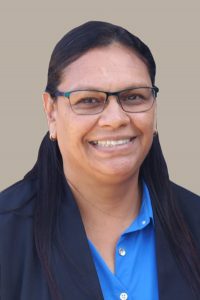
Sherry Holzapfel, ED, Aboriginal and Torres Strait Islander Health.

Jackie Hanson, Chief Executive, Metro North Health
Today is National Close the Gap day. The theme is ‘Transforming Power’ encouraging Aboriginal and Torres Strait Islander-led transformation, equality and equity gender justice, and allyship. This significant day recognises and highlights the importance of coming together to take meaningful action in support of achieving health equality for Aboriginal and Torres Strait Islander people.
We would like to take the opportunity on this important day of reflection to acknowledge and pay our respects to the Turrbul, Jagera, Yugara, Kabi Kabi and Jinibara Traditional Custodians of the lands and water on which our health services reside and take place on.
This year is particularly exciting as Metro North works towards developing its first Health Equity Strategy guided by the Queensland’s Aboriginal and Torres Strait Islander Health Equity Framework under the Hospital and Health Boards Act 2011.
What does this mean for you? Each of us has a role to play working towards health equity and improving health outcomes for Aboriginal and Torres Strait Islander people. Visit our the Metro North Health Equity webpage to learn more.
Despite our efforts across Metro North, there is still a lot more work to be done in this space. There is still a large life expectancy disparity between Aboriginal and Torres Strait Islander people and non-Aboriginal and Torres Strait Islander peoples. The current estimated life expectancy gap is around 7.3 years (6.7 years for women and 7.8 years for men). Without reform, system change and addressing unconscious bias we will not be able to Close the Gap by 2031.
Metro North Health is partnering with the Aboriginal and Torres Strait Islander community, patients, Elders, Traditional Owners, staff, community-controlled organisations and the Brisbane North PHN to develop a co-designed Health Equity strategy. A draft of the strategy will be available next month, and the Board will formally endorse our plan on 26 April 2022.
Thank you to all staff and services for your commitment to closing the gap and in particular acknowledge the work and dedication of our Aboriginal and Torres Strait Islander colleagues who support and care for Aboriginal and Torres Strait Islander patients and consumers on their health journey.
We now leave you with this powerful video from Elder Sheila Humphries taking you on her journey to rebuild her life. As you watch this video we ask that you reflect on how her life experience and others like Aunty Sheila contribute to the ongoing trauma, intergenerational trauma, and health detriments of First Nations people. Recognising and respecting this history will help us better understand some of the underlying mistrust and hesitancy to receive health care and why we all need to work together to close the health gap.
Regards,
Jackie and Sherry